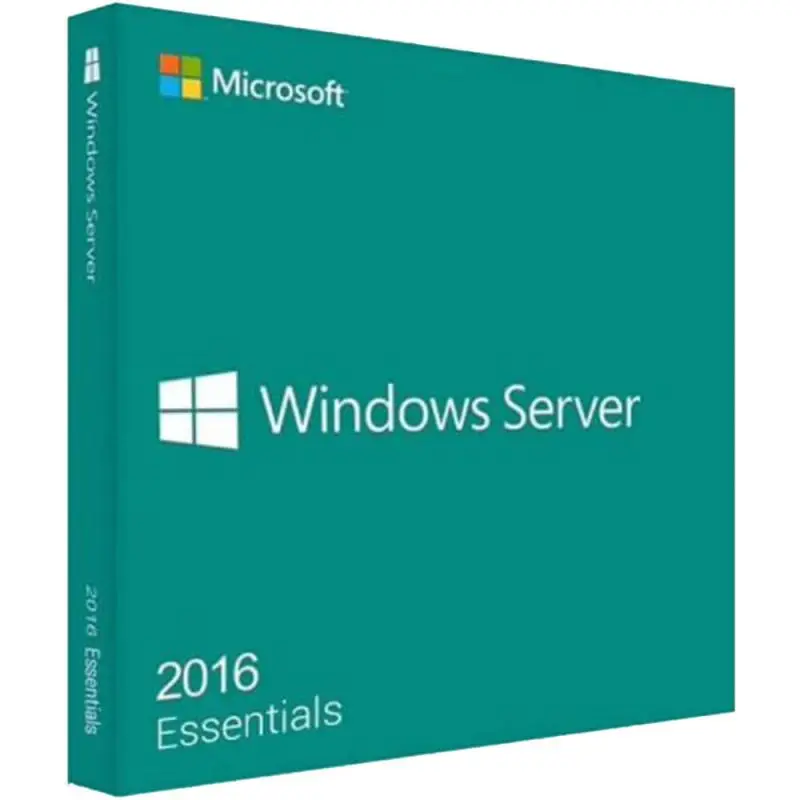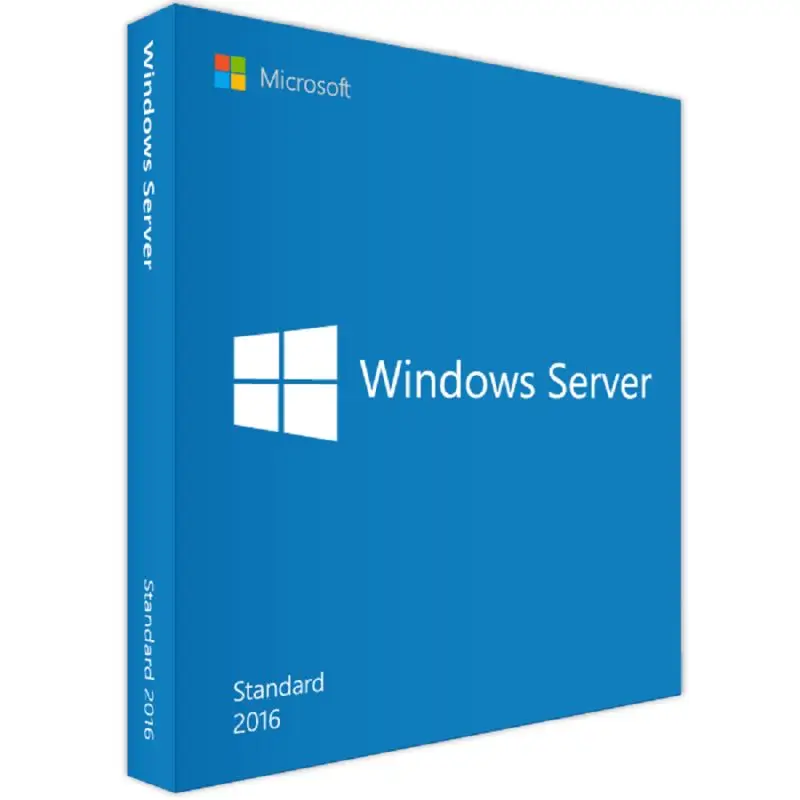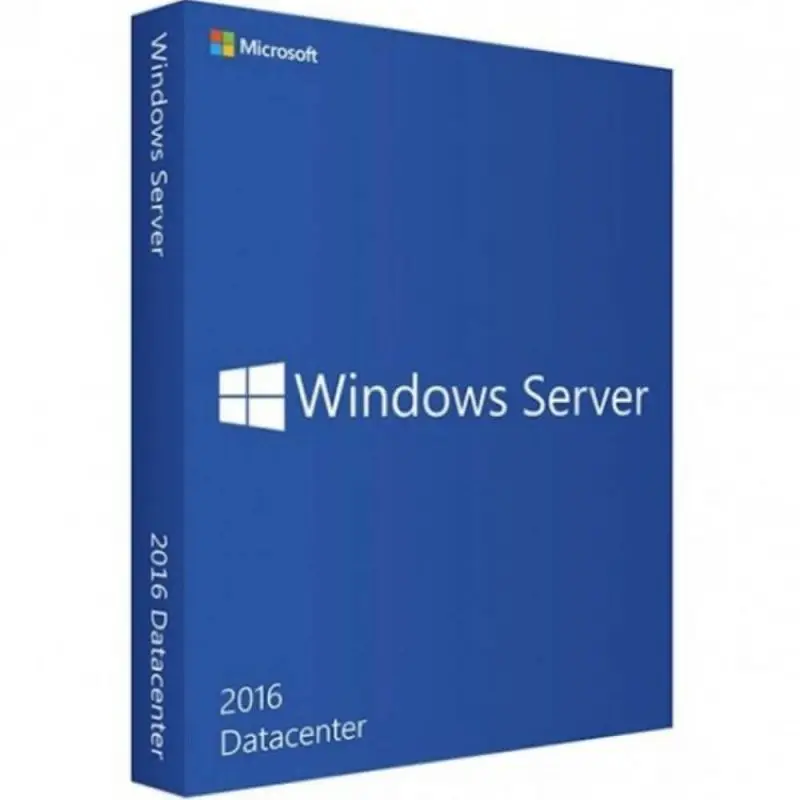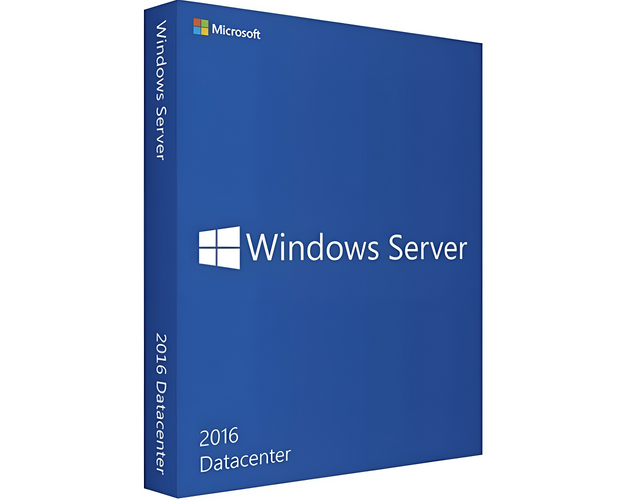Guaranteed Authenticity
All our softwares are 100% authentic, directly from official manufacturers.
Warranty
Enjoy peace of mind with our 16 Cores warranty, far beyond the standard 30 days.
Free Installation
Enjoy a free installation service for a hassle-free setup.
24/7 Customer Support
Our dedicated team is available anytime to assist you.
Best Prices
Get the best prices: $2299 instead of $2599.00 and save $300!
Description
Windows Server 2016 Datacenter: Overview
- Cloud and Container Technologies: Configure virtual cloud technologies and Windows containers for various domains. Enjoy high speeds and increased flexibility, facilitating rapid provisioning and transfer of large data volumes.
- Failover Clustering: Avoid and minimize storage and network failures with failover clustering or high-availability clustering. Ensure application continuity within server groups.
- Secure Server Management: Utilize new server roles and Nano Server without a graphical user interface to enhance performance and reduce maintenance.
- Storage Replica: Protect your data against failures with storage replicas, offering preventive protection.
- Storage Spaces Direct: Create scalable and highly available storage systems using local storage.
- Shielded Virtual Machines: Fully protect virtual machines from one another, ensuring that data is secure against unauthorized access.
- Software Defined Networking (SDN): Centrally manage and configure virtual and physical network devices, including switches, gateways, and routers.
Windows Server 2016 Datacenter: The Essential Solution for Large-Scale Server Solutions
The Datacenter edition of Windows Server was first introduced with the Windows Server 2012 release. Designed for large enterprises, data centers, and software development, the Standard and Datacenter editions were technically identical at that time. This changed with the introduction of Microsoft Windows Server 2016 Datacenter. This server edition includes features not present in the Standard version and cannot be added later. Windows Server 2016 Datacenter excels particularly in virtualization, with virtually no limitations, allowing virtualization within virtualization and the creation of large cloud infrastructures. It is not a server operating system to be installed quickly; a thorough understanding of its various features is required.
Information on Microsoft Windows Server 2016 Datacenter
To use Microsoft Windows Server 2016 Datacenter effectively in your company's processes, it is essential not to overlook the quality of the server hardware. While Microsoft provides minimum requirements for its server edition, these can be safely ignored. The maximum values are much more interesting:
- Processor: x64 architecture
- Clock Speed: No limit
- RAM: Up to 24 TB
- Network Connection: At least 1 GB
- Disk Space: At least 32 GB, also accounting for space required for the swap file and log files.
Explore the Advanced Features of Windows Server 2016 Datacenter: Ultimate Performance, Security, and Flexibility
Nano Server Option:
Reduced server implementation with limited interfaces, offering increased security against attacks.
Azure Site Recovery Services:
Enables real-time replication of your virtual machines to a backup vault in Microsoft Azure.
Volume Activation:
Easy license activation for multiple devices online.
Cluster Continuous Upgrade:
Upgrades the operating system of cluster nodes without stopping Hyper-V workloads or scale-out file servers, minimizing downtime.
Enhanced Domain, User, and Device Manageability:
Supports broader deployment with multiple domains, multiple domain controllers, and the ability to specify a designated domain controller.
Storage Spaces Direct:
Creates a highly scalable software-defined storage unit with features such as caching, storage tiers, and erasure coding.
Unlimited Virtual Machines:
Supports an unlimited number of virtual machines and one Hyper-V host per license.
Exclusive Datacenter Features:
Includes features such as software-defined networking, Host Guardian Hyper-V support, shielded virtual machines, and storage replication.
Differences Between Windows Server 2016 Editions
To understand the investment in a Microsoft Windows Server 2016 Datacenter, it is important to consider the functional richness. The following features are absent in Windows Server 2016 Standard and Windows Server Essentials.
| Essentials Edition | Standard Edition | Standard Edition |
|---|---|---|
| Small companies with basic IT needs purchasing a first server, likely small or no dedicated IT department | SMBs that need advanced features, distributed office locati support for dist ted office locations, and require a flexible way to virtualize their environment | Companies of all sizes that have IT workloads, requir virtualization and advanced storage, virtualization application deployment |
| 25 users/50 devices No server CALs required | Unlimited, based on CALs | Unlimited, based on CALs |
| 1 physical or virtual | 2 VMS | Unlimited VMs |
| Must be root of domain | 2 Hyper-V containers | Nombre illimité de conteneurs Hyper-V |
| Unlimited number of Windows Server containers | ||
| Storage features including Storage Replica & Storage Spaces Direct | ||
| New Networking Stack | ||
| Shielded VMs and Host Guardian Service | ||
Why Buying Microsoft Windows Server 2016 Datacenter is Worthwhile
Migration from Windows Server 2012 Datacenter:
Ideal for upgrading and modernizing your server infrastructure.
Creating a Server Farm:
Optimizes resource management and distribution within your enterprise.
Configuring Hosting with Various Server Systems:
Allows flexible integration of different platforms for diversified hosting.
Required Configuration for Windows Server 2016 Datacenter
- Processor: 1.4 GHz or faster for a single-core 64-bit processor.
- Memory: 512 MB (2 GB for the Server with Desktop Experience option).
- Disk Space: 32 GB of free space.
- Display: Screen resolution of 1024 x 768 or higher.
- Graphics Card: DirectX 9 or later.
- Connectivity: Internet access (fees may apply) and a 1 gigabit per second PCI-compatible Ethernet adapter
- Other: Trusted Platform Module 2.0 (TPM) and UEFI 2.3.1c-based system/firmware with support for secure boot functionality.
Frequently Asked Questions
-
What is Windows Server Datacenter used for?
Windows Server Datacenter is designed for large enterprises and data centers, offering advanced features such as unlimited virtualization, scalable storage and networking options, and enhanced security. It is particularly suited for environments requiring high availability, increased performance, and centralized resource management.
-
What is the difference between Windows Server Standard and Datacenter?
The main difference lies in virtualization capabilities and advanced features. Windows Server Datacenter offers unlimited virtualization licenses, additional features like Storage Spaces Direct and Shielded Virtual Machines, whereas the Standard version is limited to two virtual machines and lacks high availability and advanced storage features.
-
What is Windows Server 2016 Datacenter?
Windows Server 2016 Datacenter is the most advanced version of Windows Server 2016, intended for environments requiring extensive virtualization management, advanced storage capabilities, and enhanced security. It is designed to provide high availability, resilience, and large-scale scalability.
-
What are the different editions of Windows Server 2016?
The main editions of Windows Server 2016 are:
- Essentials: For small businesses with simplified management.
- Standard: For physical or lightly virtualized environments.
- Datacenter: For highly virtualized environments and data centers.
-
What is the difference between Windows and Windows Server?
Windows (or Windows 10/11) is an operating system for personal and desktop computers, while Windows Server is designed for server and enterprise environments. Windows Server provides additional features for network management, virtualization, and server services, optimized for functioning as a server in a professional setting.
Features
Core
Windows Server 2016 Product Comparison Chart

|

|

|
|---|---|---|
| Small companies with basic IT needs purchasing a first server, likely small or no dedicated IT department. | SMBs that need advanced features, distributed office locati support for dist ted office locations, and require a flexible way to virtualize their environment . | Companies of all sizes that have IT workloads, requir virtualization and advanced storage, virtualization application deployment . |
| 25 users/50 devices No server CALs required | Unlimited, based on CALs | Unlimited, based on CALs |
| 1 physical or virtual | 2 VMS | Unlimited VMs |
| Must be root of domain | 2 Hyper-V containers | Unlimited Hyper-V containers |
| ❌ | Unlimited number of Windows Server containers | Unlimited number of Windows Server containers |
| ❌ | ❌ | Storage features including Storage Replica & Storage Spaces Direct |
| ❌ | ❌ | New Networking Stack |
| ❌ | ❌ | Shielded VMs and Host Guardian Service |
|
$179.99
See more
|
$199.99
See more
|
$2299
See more
|




